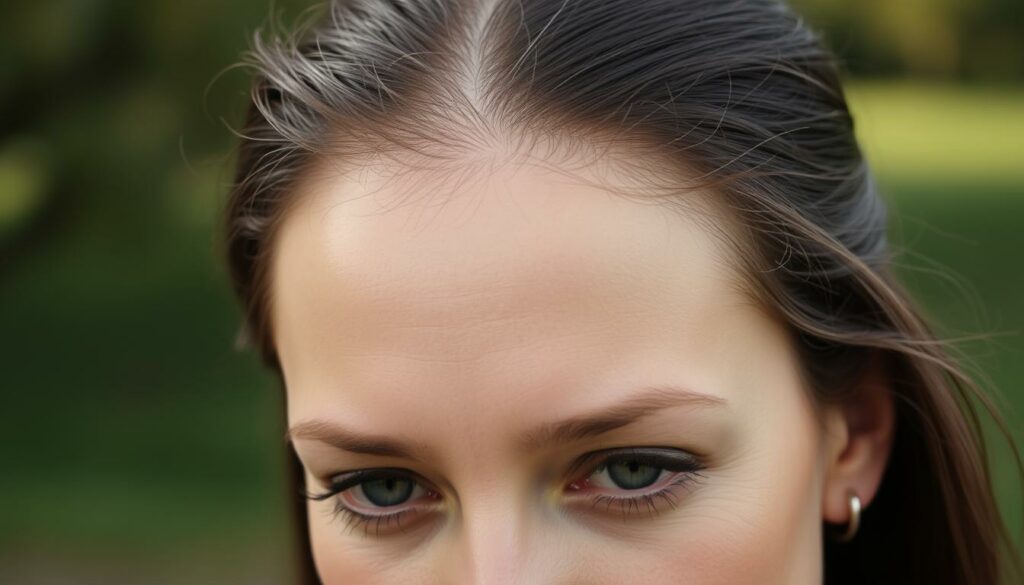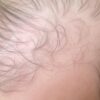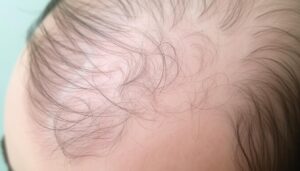Have you ever caught a glimpse of your reflection and noticed your hairline creeping further back? As a woman, experiencing a receding hairline can be distressing. But you are not alone. Millions of women worldwide struggle with this common, yet often misunderstood, issue.
The question is, what’s really causing your hairline to recede, and what can you do about it?

Key Takeaways
- Understand the underlying causes of a receding hairline in women, such as hormonal imbalances and genetics.
- Learn to identify the early signs of a receding hairline.
- Regain your confidence with hair loss solutions.
Understanding the Causes of Women’s Receding Hairline
Hormonal Imbalances
Hormonal changes can lead to a receding hairline in women. Issues like thyroid problems, PCOS, and menopause can upset hormone levels. This can cause hair to fall out more and thin at the temples and forehead.
Fixing these hormonal issues is key. This can be done through medicine or changing your lifestyle. It’s a big step in fighting a receding hairline.
Genetics and Family History
Genetics and family history play significant roles in determining various physical traits, including hairline patterns. While the focus is often on men’s receding hairlines, it is important to recognize that women can also experience hairline recession. Although less common in females, receding hairlines can lead to self-consciousness and a desire for hairstyles that can help conceal the issue.
When it comes to hairline recession in women, genetics is a key factor. If your immediate family members, such as your parents or grandparents, have a history of receding hairlines, you may be more likely to experience it as well. However, it’s important to note that female hair loss can also be triggered by hormonal changes, medical conditions, or even certain hairstyles that cause traction.
Identifying the Signs of a Receding Hairline
It’s important for women to spot the early signs of a receding hairline. This issue, known as a female bad hairline, can cause worry and upset. Knowing the signs helps women take action and find ways to fix it, like how to fix receding hairline female or how to fix hairline women.
A widening part line is a key sign of a receding hairline. As the hairline moves back, the gap between the sides of the part grows. Also, seeing more scalp on the temples or forehead is a clear sign of hairline retreat.
Scal Micropigmentation Procedure
Receding hairline women, is there a solution? Scalp Micropigmentation (SMP) is a revolutionary procedure that has gained popularity among both men and women suffering from receding hairlines. While receding hairline is often associated with men, many women also experience this issue, leading to self-consciousness and a loss of confidence. SMP offers a solution for women with a receding hairline, helping them regain their self-esteem and achieve the appearance of a fuller and natural-looking hairline.
The SMP procedure involves the application of specialized pigments onto the scalp, creating the illusion of hair follicles and giving the appearance of a full head of hair. For women with a receding hairline, this can be an effective way to fix the hairline and achieve a more youthful appearance. The procedure is non-invasive and provides immediate results, making it a popular choice for those seeking to enhance their hairline.
https://www.youtube.com/watch?v=txNBvp0ul9c
Conclusion
Women’s receding hairline is a complex issue, but it can be managed with Scalp Micropigmentation at ScalpMasters.
With Scalp micropigmentation there is a new way to help people with thinning hair or balding. It’s a natural-looking treatment, It also boosts confidence and offers a lasting fix for hair loss.
SMP is changing the game in the hair loss field. It shows how innovation and determination can help overcome hair loss. If you want to know more or get started contact us today!










